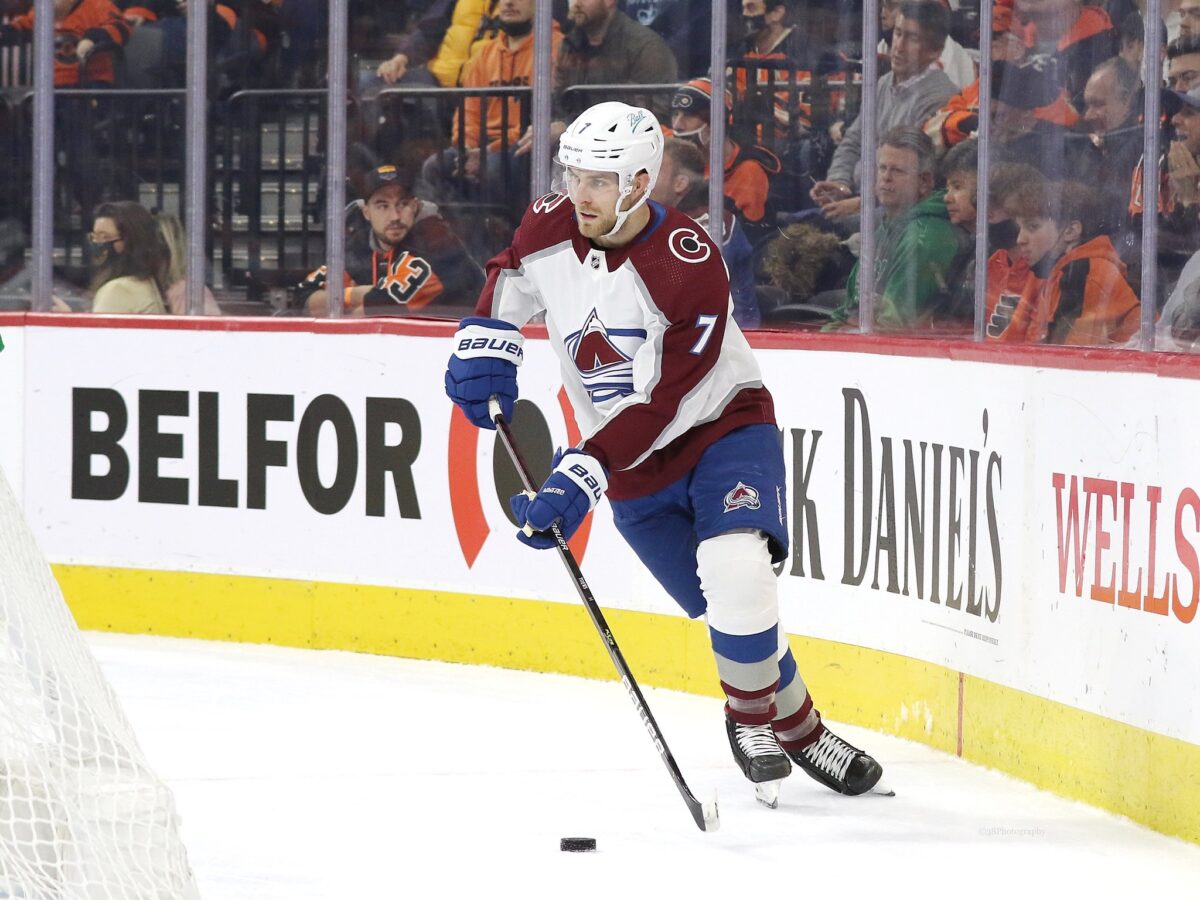Amidst the crowded 2021-22 Norris Trophy field, one dark-horse candidate has emerged to unexpectedly submit his portfolio to be crowned the NHL’s best defenseman. The dramatic entrance belongs to none other than Devon Toews, the Colorado Avalanche‘s other dazzling blueline star. Despite missing 11 games this season, he has gradually crept up the scoring leaderboard, his return coinciding with the Avalanche’s return to last year’s Presidents’ Trophy-winning form. Although he doesn’t resemble the traditional leading candidate, Toews’ demonstrable two-way impact is enough to earn him some consideration in the Norris discussion. Let’s dig in.
Toews Producing Offense at Career-Best Rate
I suppose that the burden of proof is on me to explain how I figure that Toews, not even the best defenseman on his team, is a worthy nominee for the Norris Trophy. Let’s start with his ever-expanding offensive influence, shall we? Believe it or not, the modest 31 points (nine goals, 22 assists) tallied by the 27-year-old blueliner last year in his debut season with the Avalanche represent a career-high, but Toews is on pace to blast past that total in 2021-22.
Through 21 games, the former New York Islanders defender has amassed seven goals and 17 assists for 24 points, which is a 94-point pace over a full 82-game campaign. Although it’s expected that Toews cools off as the season progresses, his 1.14 points-per-game (P/G) leads all defensemen (minimum 10 games played) this season. His 5v5 per-60 minute rates for points (P/60) and assists (A/60) both rank top seven at the position (minimum 200 minutes). When accounting for all situations (which isn’t recommended given vast discrepancies in special teams usage), Toews jumps to second in P/60, behind only the Carolina Hurricanes’ offensive specialist, Tony DeAngelo.

When considering that Cale Makar sits in second place with a production rate of 1.11 P/G, it’s clear that the Avalanche possesses an embarrassment of riches on the back-end. Retrospectively, acquiring Toews should have cost them more than a pair of second-round picks, and Lou Lamoriello’s decision to part ways with the underrated Toews over costlier, less effective players to alleviate the Islanders’ salary cap crunch proves to be increasingly short-sighted by the day. People can quibble with the idea of Toews being this successful in Long Island, but Colorado’s analytics staff has a history of mining unappreciated gems at discount rates.
Nowhere was Toews’ growing offensive skillset more apparent this season than in Colorado’s comeback win over the Toronto Maple Leafs last Saturday night. In scoring the overtime winner, Toews’ assertive move capped off a captivating back-and-forth affair between two of the NHL’s biggest proponents of fire-wagon hockey, adding to his unexpected scoring outburst to start the year.
Underlying Toews’ sizeable point production is his underrated ability to locate teammates in dangerous areas and work to put them in a position to fire off threatening shot attempts. Apart from Quinn Hughes (10.9) and Samuel Girard (10.6), no other defender has completed as many primary shot assists (the final completed pass before a shot) per-60 as Toews has this season (10.2), according to data collected by Corey Sznajder. He might not eclipse Makar as a complete offensive unit, but he’s no slouch either. Although Makar’s attacking impact is nearly unparalleled in the current NHL landscape, Toews separates himself on the defensive end.
Toews, Not Makar, Is Colorado’s Defensive Compass
In allowing Makar to roam free offensively, Toews functions as the Avalanche’s vital defensive conscience. Toews is playing almost a minute more than Makar this season, especially outpacing him on the penalty kill where Toews features over two minutes more on average than his younger counterpart. The focus is clearly on utilizing Makar’s immense offensive talent to create scoring chances, which is fine, but Toews has to juggle more difficult and diverse usage as a result.
Toews is an adept defender of his blueline, allowing fewer than 2.5 defensive zone entries with a chance against per hour, a prevention rate that ranks well-above-average among qualified blueliners. Makar beats him here, though, but that’s not a slight against Toews, who’s not blessed with the same physical gifts, having to rely more heavily on his spatial awareness and keen defensive instincts to break up neutral-zone plays.
You May Also Like:
- NHL Rumours: Fiala Injury Fallout, Wallstedt to Senators & Kane Deal Coming
- Colorado Avalanche’s Most Successful Olympians of All-Time
- 3 Names the Avalanche Should Target After Olympic Freeze
- Avalanche Week Ahead: Schedule & Storylines – Olympic Break Edition
- 3 Takeaways from the Avalanche’s 4-2 Win Over the Sharks
In terms of 5v5 on-ice metrics, even though pair’s shot- and chance-suppression rates rank grade out as some of the league’s stingiest, Toews outshines Makar, further affirming his robust two-way capabilities. Additionally, Toews has played slightly more of his even-strength minutes against the opposing team’s three most utilized forwards, while Makar lags narrowly behind in such usage. It’s a slim margin, but it demonstrates how Toews isn’t being sheltered from the top competition despite his quiet reputation.
Among defensemen to have played at least 200 minutes at 5v5, Toews ranks third in unblocked shots conceded (FA/60), fourth in scoring chances permitted (SCA/60), and seventh in expected goals allowed per hour (xGA/60). The Avalanche also controls 58.5% of shot attempts (third) and 61.1% of high-danger chances (HDCF%), with Toews on the ice, outscoring the opposition 26-11 in actual goals to boot. In addition, Toews’ average 5v5 ice-time of 18:52 is tied for 15th among qualified defenders, meaning he hasn’t put up those results behind a drastically reduced workload.

Those results are encouraging, but are they just a byproduct of playing alongside Colorado’s other stars? Upon further investigation, that doesn’t appear to be the case. In the 235 5v5 minutes that Toews and Makar have played together, they account for 57.2% of SCF and 53.1% of HDCF. Looking at the slightly smaller sample (160 minutes) in which Toews has skated apart from Makar, he’s owned a 62.3% and 74% in those same metrics. Makar observes an uptick in his own shot- and chance-share separate from Toews, but not as significant as his most frequent defensive partner. The pair complements each other perfectly, meshing some of the most precocious blueline talents the league has to offer. Still, Toews is a formidable force in his own right, even if public perception hasn’t caught up.
For what it’s worth, Toews has played in a very limited sample of 93 5v5 minutes without any of Makar or Colorado’s first-line, compiling 65.1% of scoring chances, 84% of high-danger chances, and an 8-2 count of actual goals. Whatever the reasoning is behind those doubting Toews’ Norris credentials, it’s unfounded, as he more than holds his own without the Avalanche’s superstars. Is that enough to sway even a small number of voters in his favor?
Can Toews Sustain His Norris-Worthy Performance?
There you have it, the case for Toews to garner consideration in the final Norris Trophy voting is laid bare, although the second half of the season represents the Avalanche defenseman’s true test of merit. Is his unanticipated offensive production a mirage, or has he added an exciting new dimension to his already stuffed toolbox? In any case, his on-ice results away from Colorado’s main stars and the team’s regular-season performance will do the talking in the year-end awards summit. Whatever the outcome, Toews’ influence can be denied no longer – he is much, much more than a fortunate beneficiary of Makar’s excellence, and it’s time he got his overdue recognition.
Data courtesy of All Three Zones, Evolving Hockey, MoneyPuck, and Natural Stat Trick.
